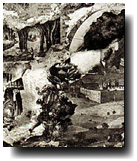Most Victorian epistemologies presupposed a superintending
unity of knowledge. A comprehensive knowledge
of the world was for most of the century the explicit goal of all forms
of learning. People began the nineteenth century believing that all the
knowledge in the world fell into a great standing order, a category of
categories, but, after dozens of Casaubons had failed to make sense of
thousands of facts squeezed into library catalogues, biological taxonomies,
and philological treatises, they ended it by believing that the
order of things was easier said than done. By 1900 not even the librarians
at the British Museum seriously believed they would be able to chip away
at this backlog of knowledge. The great monument to Victorian knowledge,
the Oxford English Dictionary, wasn't completed until the late 1920s, by
which time the first volumes in the series were already fifty years out
of date. The intention had been to deal with old words, but there were
too many new words and too many foreign words. The practical experience
of trying to order all the incoming knowledge
from the empire had forced them to reconsider whether knowledge could
ever in fact be unified. These people had found themselves in the midst
of the first knowledge explosion. If
today we call this the "information explosion," it was because by the century's
end many people had stopped using the word "knowledge," which had always
had something about it of a prospective unity emerging, and started using
the word "information," with its contemporary overtones of scattered
disjunct fragments of fact.

 Somewhere in the logical systems of the computer is the key to a new, knowledge-searching
librarianship.
Somewhere in the logical systems of the computer is the key to a new, knowledge-searching
librarianship.



